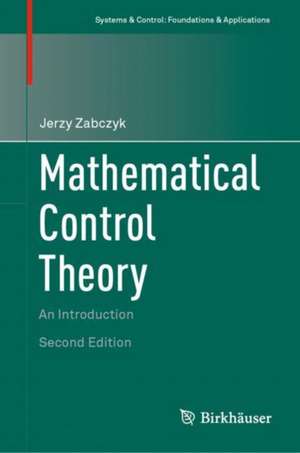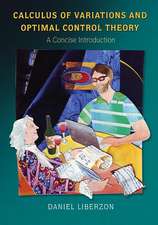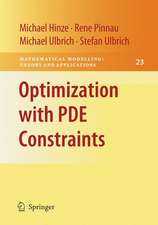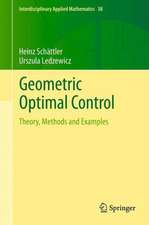Mathematical Control Theory: An Introduction: Systems & Control: Foundations & Applications
Autor Jerzy Zabczyken Limba Engleză Hardback – 21 iun 2020
In addition to classical concepts and ideas, the author covers the stabilization of nonlinear systems using topological methods, realization theory for nonlinear systems, impulsive control and positive systems, the control of rigid bodies, the stabilization of infinite dimensional systems, and the solution of minimum energy problems.
This second edition includes new chapters that introduce a variety of topics, such as controllability with vanishing energy, boundary control systems, and delayed systems. With additional proofs, theorems, results, and a substantially larger index, this new edition will be an invaluable resource for students and researchers of control theory.
Mathematical Control Theory: An Introduction will be ideal for a beginning graduate course in mathematical control theory, or for self-study by professionals needing a complete picture of the mathematical theory that underlies the applications of control theory.
From reviews of the first edition:
At last! We did need an introductory textbook on control which can be read, understood, and enjoyed by anyone. Gian-Carlo Rota, The Bulletin of Mathematics Books
It covers a remarkable number of topics...The exposition is excellent, and the book is a joy to read. A novel one-semester course covering both linear and nonlinear systems could be given...The book is an excellent one for introducing a mathematician to control theory. Bulletin of the AMS
Indeed, for mathematicians who look for the basic ideas or a general picture about the main branches of control theory, I believe this book can provide anexcellent bridge to this area. IEEE Control Systems Magazine
| Toate formatele și edițiile | Preț | Express |
|---|---|---|
| Paperback (1) | 453.60 lei 6-8 săpt. | |
| Birkhäuser Boston – 12 oct 2007 | 453.60 lei 6-8 săpt. | |
| Hardback (1) | 410.33 lei 38-45 zile | |
| Springer International Publishing – 21 iun 2020 | 410.33 lei 38-45 zile |
Din seria Systems & Control: Foundations & Applications
- 18%
 Preț: 1050.35 lei
Preț: 1050.35 lei - 17%
 Preț: 490.57 lei
Preț: 490.57 lei - 15%
 Preț: 654.95 lei
Preț: 654.95 lei - 15%
 Preț: 654.43 lei
Preț: 654.43 lei - 15%
 Preț: 641.85 lei
Preț: 641.85 lei -
 Preț: 404.51 lei
Preț: 404.51 lei -
 Preț: 400.10 lei
Preț: 400.10 lei -
 Preț: 394.51 lei
Preț: 394.51 lei - 15%
 Preț: 640.37 lei
Preț: 640.37 lei - 15%
 Preț: 635.80 lei
Preț: 635.80 lei - 15%
 Preț: 646.11 lei
Preț: 646.11 lei - 18%
 Preț: 790.28 lei
Preț: 790.28 lei -
 Preț: 382.36 lei
Preț: 382.36 lei -
 Preț: 386.39 lei
Preț: 386.39 lei - 18%
 Preț: 946.24 lei
Preț: 946.24 lei - 18%
 Preț: 1395.94 lei
Preț: 1395.94 lei - 18%
 Preț: 961.10 lei
Preț: 961.10 lei - 18%
 Preț: 968.19 lei
Preț: 968.19 lei -
 Preț: 388.34 lei
Preț: 388.34 lei - 15%
 Preț: 645.47 lei
Preț: 645.47 lei -
 Preț: 404.13 lei
Preț: 404.13 lei - 18%
 Preț: 965.02 lei
Preț: 965.02 lei - 15%
 Preț: 649.87 lei
Preț: 649.87 lei - 18%
 Preț: 974.98 lei
Preț: 974.98 lei -
 Preț: 386.00 lei
Preț: 386.00 lei -
 Preț: 393.52 lei
Preț: 393.52 lei - 15%
 Preț: 642.68 lei
Preț: 642.68 lei -
 Preț: 390.84 lei
Preț: 390.84 lei -
 Preț: 388.72 lei
Preț: 388.72 lei - 15%
 Preț: 655.45 lei
Preț: 655.45 lei - 20%
 Preț: 1003.63 lei
Preț: 1003.63 lei - 15%
 Preț: 648.89 lei
Preț: 648.89 lei - 15%
 Preț: 645.47 lei
Preț: 645.47 lei -
 Preț: 386.00 lei
Preț: 386.00 lei - 18%
 Preț: 952.89 lei
Preț: 952.89 lei -
 Preț: 396.40 lei
Preț: 396.40 lei - 15%
 Preț: 642.68 lei
Preț: 642.68 lei - 15%
 Preț: 650.19 lei
Preț: 650.19 lei
Preț: 410.33 lei
Preț vechi: 506.58 lei
-19% Nou
Puncte Express: 615
Preț estimativ în valută:
78.52€ • 83.96$ • 65.47£
78.52€ • 83.96$ • 65.47£
Carte tipărită la comandă
Livrare economică 14-21 aprilie
Preluare comenzi: 021 569.72.76
Specificații
ISBN-13: 9783030447762
ISBN-10: 3030447766
Pagini: 336
Ilustrații: XXVI, 336 p. 5 illus., 1 illus. in color.
Dimensiuni: 155 x 235 mm
Greutate: 0.64 kg
Ediția:2nd ed. 2020
Editura: Springer International Publishing
Colecția Birkhäuser
Seria Systems & Control: Foundations & Applications
Locul publicării:Cham, Switzerland
ISBN-10: 3030447766
Pagini: 336
Ilustrații: XXVI, 336 p. 5 illus., 1 illus. in color.
Dimensiuni: 155 x 235 mm
Greutate: 0.64 kg
Ediția:2nd ed. 2020
Editura: Springer International Publishing
Colecția Birkhäuser
Seria Systems & Control: Foundations & Applications
Locul publicării:Cham, Switzerland
Cuprins
Preface.- Preface to the second edition.- Introduction.- Part I. Elements of Classical Control Theory.- Chapter 1. Controllability and Observability.- Chapter 2. Stability and Stabilizability.- Chapter 3. Controllability with Vanishing Energy.- Chapter 4. Systems with Constraints.- Chapter 5. Realization Theory.- Part II. Nonlinear Control Systems.- Chapter 6. Controllability and Observability of Nonlinear Systems.- Chapter 7. Stability and Stabilizability.- Chapter 8. Realization Theory.- Part III. Optimal Control.- Chapter 9. Dynamic Programming.- Chapter 10. Viscosity Solutions of Bellman Equations.- Chapter 11. Dynamic Programming for Impulse Control.- Chapter 12. The Maximum Principle.- Chapter 13. The Existence of Optimal Strategies.- Part IV. Infinite-Dimensional Linear Systems.- Chapter 14. Linear Control Systems.- Chapter 15. Controllability.- Chapter 16. Stability and Stabilizability.- Chapter 17. Linear Regulators in Hilbert Spaces.- Chapter 18. Boundary Control Systems.- Appendix.- References.- Notations.- Index.
Recenzii
“It enables the reader to acquire a capability to construct and analyze biological systems. The mathematical exposition is clear and with detailed explanations of important ideas and interesting results. The book takes an expository approach where the continuous prose intersects with several carefully constructed diagrams and figures. … it contains an extensive list of references and can serve as a reference text for researchers in this field.” (Stéphanie Abou and Anita T. Layton, SIAM Review, Vol. 63 (4), December, 2021)
“An appendix summarizes important mathematical background results. The treatment of both finite- and infinite-dimensional systems is a unique feature of the book … . the book remains largely a book on classical methods, though one of highest mathematical standards. The book is decidedly mathematical in style, with complete proofs of all results, stringent mathematical argumentation, and a traditional definition-theorem-proof structure. … this second edition of the classical text remains a highly valuable contribution to the field.” (Lars Grüne, SIAM Review, Vol. 63 (2), September, 2021)
“This new edition should be a useful resource for students and researchers of control theory.” (IEEE Control Systems Magazine, Vol. 41 (2), April, 2021)
“An appendix summarizes important mathematical background results. The treatment of both finite- and infinite-dimensional systems is a unique feature of the book … . the book remains largely a book on classical methods, though one of highest mathematical standards. The book is decidedly mathematical in style, with complete proofs of all results, stringent mathematical argumentation, and a traditional definition-theorem-proof structure. … this second edition of the classical text remains a highly valuable contribution to the field.” (Lars Grüne, SIAM Review, Vol. 63 (2), September, 2021)
“This new edition should be a useful resource for students and researchers of control theory.” (IEEE Control Systems Magazine, Vol. 41 (2), April, 2021)
Notă biografică
Jerzy Zabczyk is Professor Emeritus at the Institute of Mathematics at the Polish Academy of Sciences in Warsaw, Poland. His research interests include deterministic and stochastic control theory, stochastic and deterministic partial differential equations, and mathematical finance. He is the author of more than ninety research papers, and seven mathematical books.
Textul de pe ultima copertă
This textbook presents, in a mathematically precise manner, a unified introduction to deterministic control theory. With the exception of a few more advanced concepts required for the final part of the book, the presentation requires only a knowledge of basic facts from linear algebra, differential equations, and calculus.
In addition to classical concepts and ideas, the author covers the stabilization of nonlinear systems using topological methods, realization theory for nonlinear systems, impulsive control and positive systems, the control of rigid bodies, the stabilization of infinite dimensional systems, and the solution of minimum energy problems.
This second edition includes new chapters that introduce a variety of topics, such as controllability with vanishing energy, boundary control systems, and delayed systems. With additional proofs, theorems, results, and a substantially larger index, this new edition will be an invaluable resource for students and researchers of control theory.Mathematical Control Theory: An Introduction will be ideal for a beginning graduate course in mathematical control theory, or for self-study by professionals needing a complete picture of the mathematical theory that underlies the applications of control theory.
From reviews of the first edition:
At last! We did need an introductory textbook on control which can be read, understood, and enjoyed by anyone. Gian-Carlo Rota, The Bulletin of Mathematics Books
It covers a remarkable number of topics...The exposition is excellent, and the book is a joy to read. A novel one-semester course covering both linear and nonlinear systems could be given...The book is an excellent one for introducing a mathematician to control theory. Bulletin of the AMS
Indeed, for mathematicians who look for the basic ideas or a general picture about the main branches of control theory, I believe this bookcan provide an excellent bridge to this area. IEEE Control Systems Magazine
In addition to classical concepts and ideas, the author covers the stabilization of nonlinear systems using topological methods, realization theory for nonlinear systems, impulsive control and positive systems, the control of rigid bodies, the stabilization of infinite dimensional systems, and the solution of minimum energy problems.
This second edition includes new chapters that introduce a variety of topics, such as controllability with vanishing energy, boundary control systems, and delayed systems. With additional proofs, theorems, results, and a substantially larger index, this new edition will be an invaluable resource for students and researchers of control theory.Mathematical Control Theory: An Introduction will be ideal for a beginning graduate course in mathematical control theory, or for self-study by professionals needing a complete picture of the mathematical theory that underlies the applications of control theory.
From reviews of the first edition:
At last! We did need an introductory textbook on control which can be read, understood, and enjoyed by anyone. Gian-Carlo Rota, The Bulletin of Mathematics Books
It covers a remarkable number of topics...The exposition is excellent, and the book is a joy to read. A novel one-semester course covering both linear and nonlinear systems could be given...The book is an excellent one for introducing a mathematician to control theory. Bulletin of the AMS
Indeed, for mathematicians who look for the basic ideas or a general picture about the main branches of control theory, I believe this bookcan provide an excellent bridge to this area. IEEE Control Systems Magazine
Caracteristici
Introduces control theory with a number of helpful examples and applications, making it ideal for a one-semester course Covers topics frequently overlooked by introductory books, such as the realization of both linear and nonlinear systems, impulsive control, and positive linear systems Second edition includes new chapters, proofs, theorems, and results, greatly expanding its scope












